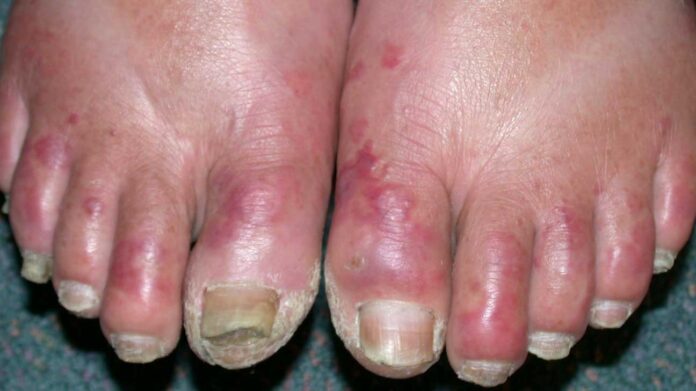Chilblains refer to small lesions that can occur due to inflammation of blood vessels that are tiny. This condition can appear after exposure to cold air. They are very painful and affect the skin of your feet and hands. There are some other names for this condition.
These are cold induced vascular disorder, pernio, and perniosis. Chilblains are skin patches that can become swollen or red. Sometimes you notice the blue color in these patches. They can look shiny because of swelling. Other symptoms are blisters, irritation, and sensation of burning.
Causes
Cold weather can lead to small blood vessels near your skin surface. It can become tighter. The small vessels start expanding once you, as an individual, warm up. It leads to leakage of blood into tissues present nearby. Moreover, it results in swelling.
After this, swelling starts irritating nerves and the affected area. It starts inducing pain. Doctors are not sure about the cause of this condition. It can be related to unusual exposure to rewarming and cold.
Risk Factors
It is not clear why chilblains occur. But there are a few reasons that can enhance the risk of development of chilblains. Following are the risk factors that can make you prone to develop chilblains.
- Smoking
- Being female
- If you live in a damp climate
- Too tight clothing
- Having lupus
- If you have 20% less or more weight than a healthier weight
- If you have the problem of poor circulation
- Having Raynaud’s phenomenon, which can lead to its sores
Diagnosis
Doctors usually diagnose the condition of chilblains during a physical exam. They can ask questions about your exposure to extreme temperatures. They can decide to do a biopsy, but this case is very rare.
The biopsy process involves the removal of a small tissue sample and its examination under a microscope to detect underlying conditions related to your skin, like skin cancer. If you previously had the issue of chilblains, you will quickly detect them on your own.
If you have not experienced them before, you may find it difficult to recognize this skin condition. In this case, check-in with your health care professional. Make sure this is not any other condition like vasculitis or cold urticaria.
Treatment
Usually, Chilblains can go away on their own in the time duration of two to three weeks. The symptoms will automatically diminish in many cases as an individual warms up. Your doctor will recommend corticosteroid cream if you have itching.
This cream is recommended to decrease inflammation. Your chilblains may not heal if you have the issue of poor circulation. Your doctor can give you blood pressure medications in some cases to help your small vessels open near the surface of your skin.
It will also help to reduce pain and inflammation. You may be successful in protecting your feet and hands from exposure to extreme weather conditions. If your symptoms last more than three weeks, contact your doctor. Pain can become severe.
Can You Do Something For Chilblains At Home?
You can do a few things at your home to get relief from the symptoms of chilblains. Try to warm up your affected skin area as you notice symptoms. You can put the affected area under any blanket. Do not apply direct heat.
The reason is that direct heat can make the symptoms of chilblains worse. Do not rub the area. Try to avoid massaging the area after getting inflammation. It can enhance your inflammation and irritation. Apply an unscented lotion to the affected area as your chilblains heal.
It is important in case your children have irritation or blisters. Try to keep your skin moisturized and clean to decrease the risks of getting an infection. Chilblains cause the feeling of uncomfort and pain. They do not cause long-term health issues.
They can heal on their own in most cases. You can get the issues of chilblains during the hot season. If you are noticing the symptoms, make an appointment with your doctor. You may have any condition that can become complicated and need immediate treatment.
Do not ignore the condition of your skin if your symptoms are severe. Sometimes home remedies do not help. In this case, consult your doctor and take effective treatment.

